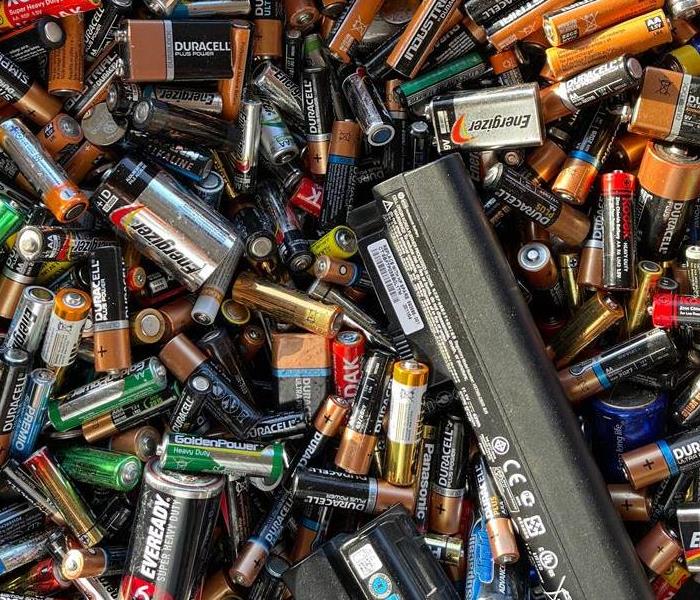Preventing Lithium Battery Fires
8/13/2021 (Permalink)
 Due to the increase in the presence of lithium batteries in our lives, it is important to understand that fire safety concerns can accompany them.
Due to the increase in the presence of lithium batteries in our lives, it is important to understand that fire safety concerns can accompany them.
In chemistry class, you may have first been introduced to lithium as the third element on the periodic table. Beyond the periodic table, however, lithium serves many different purposes, such as its function in batteries, providing portable energy to various types of electronics. There are lithium batteries as well as lithium-ion batteries and the difference between the two lies in the type of cell. It is not possible to charge lithium batteries, as they are primary cells, but lithium-ion batteries, which are secondary cells, can be recharged. You may not be aware of it, but chances are you use an electronic device regularly that is powered by either type of lithium battery. Due to the increase in the presence of lithium batteries in our lives, it is important to understand that certain fire safety concerns accompany them if they malfunction or endure damage. With a thorough understanding of the risks that accompany lithium batteries, you can protect your home or commercial business.
Why Are Lithium Batteries Such a Concern?
Even though lithium batteries can be a fire hazard, they are still put to use in our daily lives. This is because most of the time, it is safe to utilize lithium batteries, as they only become hazardous in the event that they overheat or short-circuit. Lithium-ion batteries in electronic devices often release overwhelming heat when they reach their maximum temperature, which can result from overcharging or overheating. Fires can occur under these circumstances, evident in news reports from the last several years that share concerning stories of hoverboards and cell phones igniting. However, lithium batteries are not as hazardous as such stories say they are. Categorized as Class 9 hazards according to the United States Postal Service, lithium batteries are acknowledged as miscellaneous hazardous materials, which only present hazards during transportation.
Preventing Lithium Battery Fires This Summer
It’s not difficult to find lithium batteries and lithium-ion batteries in your day-to-day life, as they are often used to power everything from laptops and cell phones to electric toothbrushes. Practicing fire safety when using lithium battery or lithium-ion battery-powered devices can protect your home or business from fire damage this summer. The summer is a critical time to learn how to prevent a fire resulting from lithium batteries, as the likelihood of portable electronics overheating naturally increases in the sizzling heat. Making sure that electronics are not left in hot cars for long amounts of time and avoiding charging in the heat can therefore decrease the chances of a fire igniting. Utilizing a trustworthy, reputable charger and investing in a high-quality phone case can also make a significant difference in protecting its battery and preventing a fire resulting from malfunctioning lithium batteries.
Have You Experienced Fire Damage? Call SERVPRO
Even though lithium battery fires do not occur frequently and do not regularly pose threats to safety, fires can occur. Therefore, having an emergency plan in place is beneficial. This is where we step in to help. Here at SERVPRO of Harrisburg West, we strive to be ready for anything. When an unexpected fire ignites in your home or commercial business, you can trust SERVPRO to provide the Fire Damage Restoration Services and Commercial Fire Damage Restoration Services that you need. At the first sign of damage, call us at (717) 510-6779 in order to prevent any further damage. Check out our website to learn more about our Fire Restoration Process, including our specific offerings such as Caring for Your Belongings, which can facilitate the cleanup process in the event that a fire impacts other objects in your home or business, including electronics, photographs, and documents. Regardless of whether your home or commercial business’ fire is ignited due to lithium batteries or another source, know that SERVPRO is standing by with our 24-Hour Emergency Service, ready to help make it “Like it never even happened.”





 24/7 Emergency Service
24/7 Emergency Service